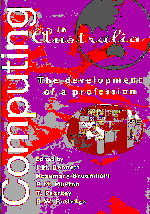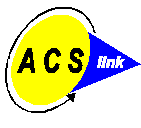 Australian Computer Society
Australian Computer Society
The ACS, the Internet and the InfoBahn
Prepared by Tom Worthington
Director, Community Affairs Board
Copyright (c) Australian Computer Society, 1995
 About the ACS
About the ACS
The Internet | Top

Computing in Australia
History of Computing in Australia (and the ACS)
Written and edited by Australia's computing pioneers (and the
founders of the ACS):
From the time the first computer program ran on the Mark l at CSlR (now
CSIRO) in late 1949, Australian science and industry has been at the
forefront of the development of information technology, and of applying
it widely throughout Australian society.
Available from technical book stores and the ACS.
The ACS | Top
 ACS Internet Activities
ACS Internet Activities
The ACS | Top
The Internet
- Internet
- Any collection of interconnected computer networks.
- The Internet
- A global interconnection of computer networks, using Internet (IP) protocols.
- Internet Protocols (IP)
- A set of technical standards for computer communications on the Internet. Also commonly known as TCP/IP.
- Internet features
- Administratively it is a non-hierarchical, collaborative arrangement.
- Was a USA Defence project
- Robust and dispersed design from military requirements
- AARNet (Australian Academic and Research Network)
- The Australian Internet: in the world top five
- Owned by the Australian Vice-Chancellor's Council (AVCC)
- Funded by Universities and research bodies
- Internet services
-
Global data communications, for other services to use
- e-mail
- Electronic Mail: one to many messages, with binary attachments
- News
- Usenet news global computer conference facility. Now accessible via the Web.
- Gopher
- Menu based information service. Superseded by the Web
- FTP
- File Transfer Protocol: for transmission of data files. Now accessible via the Web.
- WAIS
- Wide Area Information Service: a document indexing and retrieval service. Now accessible via the Web.
- The Web
- The World Wide Web (or WWW): A global hypertext system on the Internet. Access to linked and indexed documents. Has interfaces to other Internet services (e-mail, news, FTP, Gopher, WAIS). Easy to use GUI interfaces. Provides formatted text, images, sound and video.
The Web
- Hottest thing on the Internet
- Most important computer application of 1995
- Easy to use PC and Mac client software available
- Easy to self publish in Web format.
- Real multimedia
Internet Users
- Routine tool for University and research community. University library catalogues; scientific papers and data on-line
- Government agencies beginning to make similar use. Commonwealth Internet Reference Group working on a whole-of-government approach.
- Limited use by the general community
- ACS's ACSlink service for members
Internet to InfoBahn
- Sound, graphics and images via the Internet now
- E-mail to fax free.
- Text and audio conferencing now
- Video "multicast" experimental
- May compete with telephone and cable TV services
The InfoBahn | Top
The Information Superhighway (InfoBahn)
The InfoBahn | Top
Vision for a Networked Nation
ACS public interest submission to:
Available at URL:
ftp://archie.au/ACS/ACS-policy-networking-paper-draft.txt & Abstract
at URL:
ftp://archie.au/ACS/ACS-policy-networking-abstract-draft.txt.
Information infrastructure for Australia
- Internet model
- Not telephone or broadcasting model
- Public policy measures are identified
- Social equity, multi-media literacy and network civil rights
Public Interest Protection
- universal access to a basic level of service
- for consumers, community groups, incorporated associations and small
businesses
- for sectors dependent on government funding:
- education; research; health; and libraries;
- civil rights
- freedom of access to information;
- freedom of communication; and
- freedom from monitoring.
Government
- Leadership
- have a policy
- targeted funding during the early years
- Co-ordination - sponsorship
- public policy advisory body
- regional public interest summits
- development and use of open, non-proprietary standards
Government Measures
- grants
- not just Co-operative Research Centre for Research Data Networks
- community-based applications and prototypes.
- research implications of the technology and its applications
- government agency participation
- connect the Australian Parliament to the public
- government data freely available over the NII
- make sure intellectual property laws enhance
creativity
-
Government Regulations
- Adapt existing laws for networked
environment
- balance interests of owners of data and users of
data
- remove obstacles to diversity among carrier-
technologies, carriers and services
The InfoBahn | Top
ACS/ACCE Computers in Schools discussion paper
- Jointly from ACS & Australian Council for Computers in Education
- Released by the 22 Apr 1995 for comment
Main points:
- Addresses lack of national framework for Computers in Education in Australia
- Gives advice to schools offered
- Reviews the growth of computers in education
- Stresses importance of a coherent environment for IT stressed
- Sections on 'protecting minors' and 'equity issues'.
- Provides strategy for mapping information resources against curriculum needs
- Community liaison stressed
-
Paper available at:
URL: http://www.clare.tased.edu.au/acspaper/compsch1.html
The InfoBahn | Top
Censorship in Cyberspace
The InfoBahn | Top
ACS Submission on computer games regulation
Made to chief censor 20 July 1993:
- Individual rights V protecting some members of society.
- Difficulty of regulating digital media.
Methods of regulation discussed:
- Voluntary self-classification of material
- Voluntary access control
- Code of Conduct for producers of material.
Available at: http:acslink.net.au/~tomw/comprn13.txt
Censorship | Top
Senate BBS regulation submission
Draft report ACS & EFA joint task force on "Freedom in Cyberspace"
Set up in February 1995 to respond to
Government BBS report and advise ACS and EFA on action.
REPORT RECOMMENDATIONS
- Government BBS Task Force report be published electronically immediately.
- Reject government report recommendations as technical naive.
- Open a dialogue on the Internet between government and on-line community.
- Adopt "Information Carrier" guidelines.
- Law on liability put responsibility on originator, not information carriers.
- Encourage Internet software authors to provide parental control of children's access.
- Encourage system administrators to establish complaints mechanism.
BEST AND THE WORST OF THE INTERNET
Invited networking community to
suggest the "best" and the "worst" of the Internet. To
display a selection of this material on-screen
Tuesday 4 April.
REQUEST PROCEEDINGS BE PUT ON-LINE
Request a transcript of seminar to be made available on the
Internet.
Submission: http:acslink.net.au/~tomw/sensub1.html
Public seminar: http:acslink.net.au/~tomw/senpr.html
The InfoBahn | Top
 Australian Computer Society
Australian Computer Society Australian Computer Society
Australian Computer Society About the ACS
About the ACS
 ACS Internet Activities
ACS Internet Activities